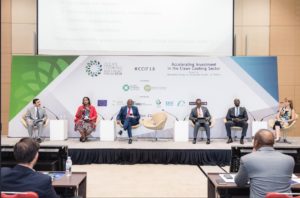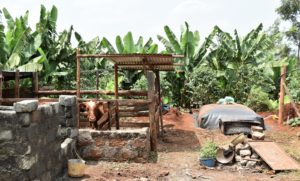
Search
I recently attended what was billed as the first-ever convening of business leaders, investors, donors and government representatives to collaborate on developing an industry to deliver modern, clean cooking solutions at scale around the world. The investor forum hosted by the Clean Cooking Alliance in Kigali, Rwanda (November 5-6) brought together well over 300 attendees from more than 40 countries and offered engaging presentations and panel discussions.

Image: Panel discussion during Clean Cooking Investment Forum 2018. Source: Clean Cooking Alliance
Here are three insights I took away from the forum:
1. Cooking with dirty and dangerous fuels is a serious problem that affects a large portion of the world’s population.
As someone who doesn’t work in the clean cooking sector but rather assists that industry by providing the TaroWorks mobile field service app to help manage business operations of customers like Proyecto Mirador, the numbers presented at the conference were staggering. An estimated three billion people worldwide are cooking on open fires or using dirty and dangerous fuels like charcoal and wood. A study by the World Health Organization indicates that household air pollution kills four million people per year and tends to primarily affect women and children in Africa and Asia.
As former Secretary-General of the United Nations Kofi Annan once said, “For too long, cooking has been a silent killer in developing countries around the world”. Greater attention, and more importantly, collaboration from all players – governments, investors and entrepreneurs – needs to be the focus to tackle this immense challenge and make clean cooking a reality for underserved populations. To help bring greater awareness, The Clean Cooking Alliance has teamed up with Academy Award-winning American actress Julia Roberts to release a new public service announcement.
2. There are many unique and innovative entrepreneurs in the clean cooking space offering different solutions for the at-risk population whether urban, peri-urban or rural.
Many passionate entrepreneurs exist in the clean cooking sector that are using different approaches to assist customers worldwide. Organizations like Acacia Innovations in Kenya and Inyenyeri in Rwanda produce eco-friendly briquettes and pellets that combine with efficient cookstoves to target institutional and individual users in both urban and peri-urban settings.
Liquid Petroleum Gas (commonly referred to as LPG) is often considered too expensive an alternative to charcoal or wood for many base of the pyramid consumers. However, organizations like TaroWorks client Wana Energy Solutions in Uganda are introducing the concept of Pay-As-You-Cook (similar to the solar sector’s Pay-As-You-Go) which allows consumers to make small, incremental payments to purchase only the amount of cooking gas needed daily or in that moment (without having to pay upfront for an entire cylinder’s worth of fuel).
Finally, for consumers in more rural environments with less developed infrastructure (where distribution of LPG might not be possible), TaroWorks client Sistema.bio sells, installs and services hybrid reactor biodigesters, which transform animal manure from small and medium size farms into biogas for clean cooking and a nutrient-rich organic fertilizer (Read More)
 Image: Farmer Erastus Njuguna’s cows and Sistema.bio’s biodigester side-by-side on his farm in Kiambu County, Kenya. Source: TaroWorks
Image: Farmer Erastus Njuguna’s cows and Sistema.bio’s biodigester side-by-side on his farm in Kiambu County, Kenya. Source: TaroWorks
3. Foreign investors need to fund more local entrepreneurs, greater investment by local funders is crucial and both investors and entrepreneurs need to collaborate more often.
“We all know that supporting clean cooking solutions makes common sense, but it also needs to make business sense,” said Frédérique de Man, the Netherlands Ambassador to Rwanda, who addressed the clean cookstove conference. I can surely understand this sentiment, however, I got the sense from a few entrepreneurs who participated in a subsequent Q&A that at least some local entrepreneurs in East Africa feel excluded from the investment that is being awarded to organizations started by foreign entrepreneurs.
Additionally, there also appears to be a lack of local African investors who are investing in either foreign or local clean cooking entrepreneurs. This second observation was illustrated, on a small scale, during a panel discussion in which only one of the five clean cooking entrepreneurs on stage said they had received investment from a local investor.
The disconnect between investors and entrepreneurs also came to the forefront during a discussion on results-based financing and other innovative financing structures for the clean cooking sector. Entrepreneurs repeatedly asked to be at the table with investors when key metrics for results-based financing investments are being discussed and created.
A greater collaboration will undoubtedly start to raise the profile of the clean cooking ecosystem which will help bring more investment. Hopefully, local investors will lead the way to support local entrepreneurs to guarantee a greater impact on the three billion people worldwide without access to clean cooking.
POST TOPICS
PREVIOUS POST
Sign up to receive emails with TaroWorks news, industry trends and best practices.
TaroWorks, a Grameen Foundation company.
Site by V+V